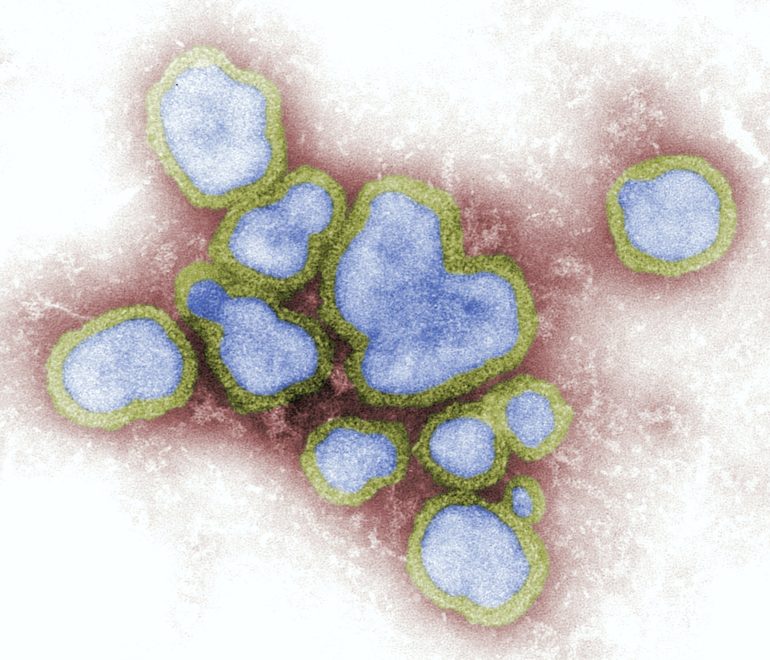Over years of studying antibody responses against the flu in the Wilson lab at the University of Chicago, researchers kept coming up with a strange finding: antibodies that seemed to bind not only to the flu virus, but to every virus the lab could throw at them. Since antibodies are usually highly specific to individual pathogens, in order to maximize their targeted protective response, this pattern was extremely unusual.
Until finally, they realized: The antibodies weren’t responding to the viruses, but rather to something in the biological material in which the viruses had been grown. In every case, the virus had been propagated in chicken eggs—more specifically, in a part of the egg called the allantois. The findings were published on June 15 in mBio.
“Growing vaccines in eggs is the old school way of doing things because it’s cheap and you can grow a lot of virus in eggs,” said first author Jenna Guthmiller, Ph.D., a postdoctoral fellow at UChicago. “Now we’re finding that these antibodies bind to this glycan—a sugar molecule—found in eggs, which means that people who are getting vaccinated are producing an antibody response against this egg component that’s not related to the virus at all.”
The fact that vaccines grown in eggs can lead to this off-target antibody response is unexpected, but the implications aren’t yet known. It could mean that the immune system diverts resources away from developing protective antiviral antibodies to produce these egg sugar antibodies instead, which could have implications for vaccine effectiveness.
It’s important to note that these antibodies do not bind to known egg allergens, indicating that they likely are not the culprits behind egg allergies, Guthmiller said. “It doesn’t seem to be harmful, but it may not be beneficial, and it may be affecting immunity, and that’s the important next step.”
It took the team years to determine that the antibodies were linked, not to the viruses they were studying, but rather to the eggs in which they were grown. “No joke, we spent years thinking about this,” said Guthmiller. “But once we figured it out, it was straightforward. And we found that it’s very specific to the flu vaccine grown in this one compartment, in the allantois. This isn’t seen with vaccines grown in other chicken cells.”
The antibodies target a sugar molecule, known as a glycan, called N-acetyllactosamine (LacNAc), with a sulfur modification. LacNAcs are a common glycan in humans, but the specific sulfur modification of LacNAc found in eggs is not known to be expressed in humans. Because of this, humans can produce antibodies against this sulfur-modified glycan.
When the researchers dug into past studies on flu antibody responses, they found that this antibody response against LacNAc appears to be fairly common following flu vaccination. However, some people do not seem to develop the anti-egg antibodies, and it doesn’t appear that producing the anti-egg antibodies reduces the immune system’s ability to produce anti-flu antibodies—though it’s not clear whether or not there is an impact on vaccine effectiveness.
“There’s a little bit of evidence so far that suggests vaccines prepared by other methods are more effective than those grown in eggs, but the precise reasons aren’t known,” said Guthmiller. “This could be a potential mechanism, but we weren’t able to address that in this study.”
So far, there is no evidence that the presence of these antibodies has any negative impact on an individual’s health. “We just really don’t know what function these antibodies have,” said Guthmiller. “So many people get the flu vaccine every year, and adverse events are extremely uncommon, so there’s no reason to suspect that this might cause any problems.”
More research is needed to determine what, if anything, these anti-egg antibodies mean for the effectiveness of the flu vaccine. “We don’t know how these antibodies impact our flu-specific response. There may be competition between B cells against the flu and these egg glycans, which could be impacting immunity. And if there is an association between egg antibodies and reduced immunity, we need to look at alternative methods for flu vaccine production. Anything that can improve vaccine production is something that we should be considering seriously.”
Newly identified antibody can be targeted by HIV vaccines
More information:
Jenna J. Guthmiller et al, An Egg-Derived Sulfated N -Acetyllactosamine Glycan Is an Antigenic Decoy of Influenza Virus Vaccines, mBio (2021). DOI: 10.1128/mBio.00838-21
Provided by
University of Chicago Medical Center
Citation:
Vaccines grown in eggs induce antibody response against an egg-associated glycan (2021, July 2)
retrieved 2 July 2021
from https://medicalxpress.com/news/2021-07-vaccines-grown-eggs-antibody-response.html
This document is subject to copyright. Apart from any fair dealing for the purpose of private study or research, no
part may be reproduced without the written permission. The content is provided for information purposes only.



